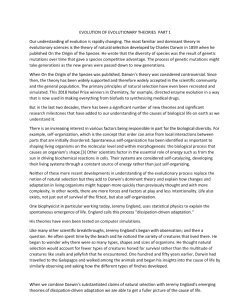EVOLUTION OF EVOLUTIONARY THEORIES Our understanding of evolution is rapidly changing. The most familiar and dominant theory in evolutionary sciences is the theory of natural selection developed by Ch
EVOLUTION OF EVOLUTIONARY THEORIES Our understanding of evolution is rapidly changing. The most familiar and dominant theory in evolutionary sciences is the theory of natural selection developed by Ch
EVOLUTION OF EVOLUTIONARY THEORIES PART 1
Our understanding of evolution is rapidly changing. The most familiar and dominant theory in evolutionary sciences is the theory of natural selection developed by Charles Darwin in 1859 when he published On the Origin of the Species. He wrote that the diversity of species was the result of genetic mutations over time that gave a species competitive advantage. The process of genetic mutations might take generations as the new genes were passed down to new generations.
When On the Origin of the Species was published, Darwin’s theory was considered controversial. Since then, the theory has been widely supported and therefore widely accepted in the scientific community and the general population. The primary principles of natural selection have even been recreated and simulated. This 2018 Nobel Prize winners in Chemistry, for example, directed enzyme evolution in a way that is now used in making everything from biofuels to synthesizing medical drugs.
But in the last two decades, there has been a significant number of new theories and significant research milestones that have added to our understanding of the causes of biological life on earth as we understand it.
There is an increasing interest in various factors being responsible in part for the biological diversity. For example, self-organization, which is the concept that order can arise from local interactions between parts that are initially disordered. Spontaneous self-organization has been identified as important to
Our understanding of evolution is rapidly changing. The most familiar and dominant theory in evolutionary sciences is the theory of natural selection developed by Charles Darwin in 1859 when he published On the Origin of the Species. He wrote that the diversity of species was the result of genetic mutations over time that gave a species competitive advantage. The process of genetic mutations might take generations as the new genes were passed down to new generations.
When On the Origin of the Species was published, Darwin’s theory was considered controversial. Since then, the theory has been widely supported and therefore widely accepted in the scientific community and the general population. The primary principles of natural selection have even been recreated and simulated. This 2018 Nobel Prize winners in Chemistry, for example, directed enzyme evolution in a way that is now used in making everything from biofuels to synthesizing medical drugs.
But in the last two decades, there has been a significant number of new theories and significant research milestones that have added to our understanding of the causes of biological life on earth as we understand it.
There is an increasing interest in various factors being responsible in part for the biological diversity. For example, self-organization, which is the concept that order can arise from local interactions between parts that are initially disordered. Spontaneous self-organization has been identified as important to
